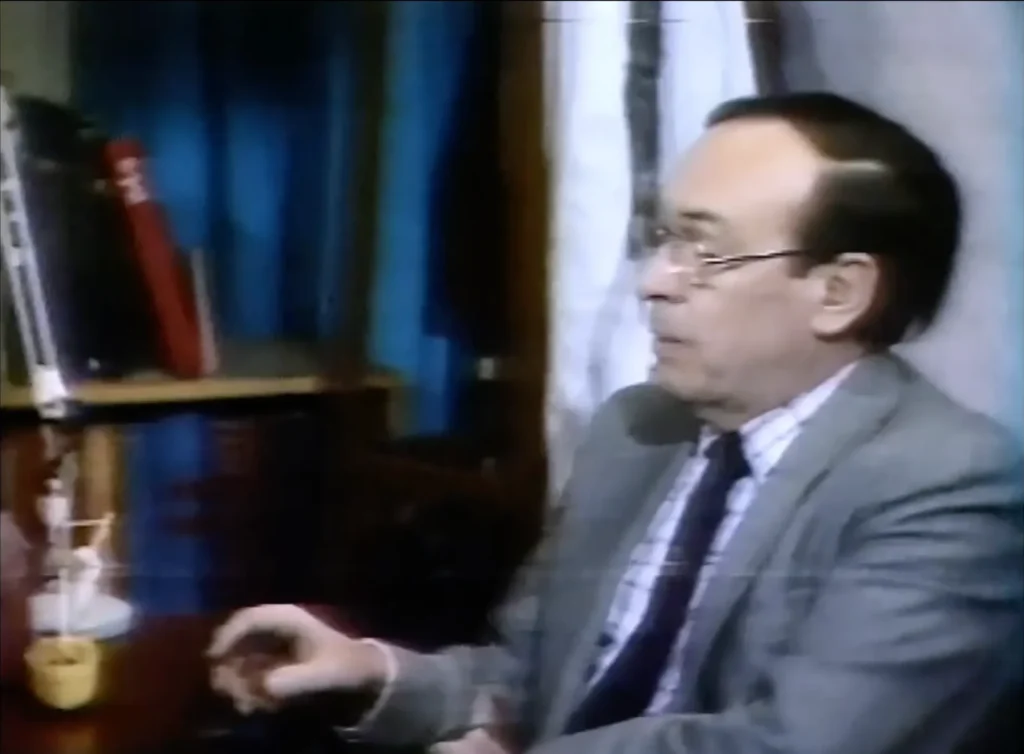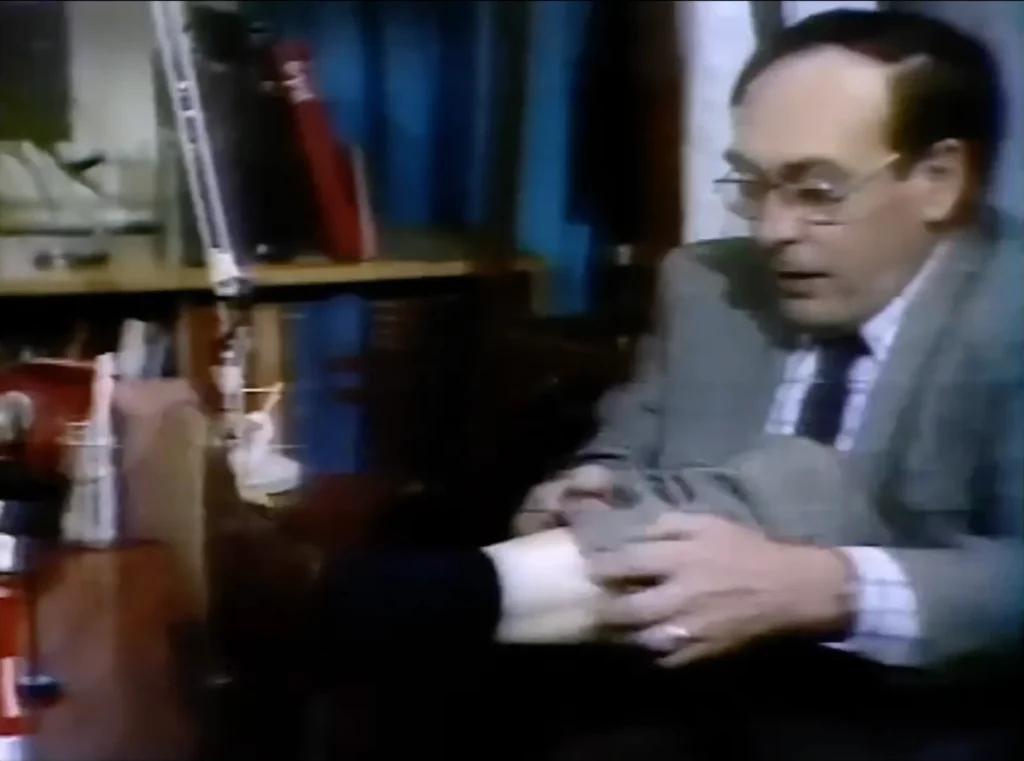You are qualified?
- DOCTORS & PATIENTS IN COLOUR - YOU ARE QUALIFIED?
“I thought I was going to see old Buster Brown.”
In this recording, we enter the consultation room as Mr Clinton, a ‘close personal friend’ of Dr Brown’s who is the senior partner, hangs up his umbrella. He is visibly disappointed to learn that his regular doctor, Dr Brown, is on holiday in Wales. “I thought I was going to see old Buster Brown,” he expresses. This initial disappointment sets the tone for the consultation, as Mr Clinton will now see Dr Saunders, who recently started at the practice.
When Mr Clinton arrived for his appointment, he informed Dr Saunders that he was there for his usual prescription. “I just come along, and he writes me a prescription,” mentions Mr Clinton. However, since it was Dr Saunders’ first time meeting Mr Clinton, he was unfamiliar with his medical history or needs. During the consultation, there is a back-and-forth exchange of ideas between the patient and the doctor. Mr Clinton then mentioned his long-standing relationship with Dr Brown. He expressed frustration that Dr Brown would have already written him a prescription for his medication, indomethacin, if he were available.
The patient is very thorough in questioning the doctor’s every statement. Mr Clinton starts by asking the young doctor about his thoughts on the current pathology of gout. Dr Saunders responds, “For the gout.” Mr Clinton replies, “That’s very interesting.” Then he asks, “Do they teach using these short, impertinent words these days?” Defensively, Dr Saunders says, “No, I don’t call it gout.” He continues to say that he has not seen him. At this point, the new doctor and the patient are bickering and talking over each other.

"Poly-arthr-algia"
Mr Clinton explained that he and Dr Brown use the term “polyarthralgia” to describe the illness because it doesn’t necessarily involve arthritis or joint inflammation but rather a pain without inflammation. He mentioned that “Algos” is the Greek word for pain and that “poly” is used because it covers more than just gout. The patient then explained their preference for “poly-arthr-algia,” providing its Greek definition: “The Greek word Algos. And it’s ‘poly’ because it isn’t just gout, frankly.” It can be anywhere and everywhere. In this conversation, Mr Clinton, an older man, spoke condescendingly to Dr Saunders, undermining his knowledge and skills.
Dr Saunders mentions it has only ever been recorded in his feet and knees. To which Mr Clinton says, “That’s old buster, he might not be too particular on the details.” Then he says, somewhat contradictory, that Dr Brown is not the greatest, which is a surprise after all the praise he has given his old doctor until now.
Next, Mr Clinton abruptly changes the subject and asks Dr Saunders if he knows Carol, Dr Brown’s wife, and how good her handicap is. When Dr Saunders seeks clarification, Mr Clinton dismisses the topic, implying that it might be embarrassing for the doctor to discuss it. This abrupt change of topic shows Mr Clinton’s disregard for the doctor’s time and expertise.
Oh, they let you deal with patients, do they?
Mr Clinton asked Dr Saunders where he attended medical school. Dr Saunders was trained at St. Thomas’s and had recently joined the practice as a doctor. When Mr Clinton asked where he was now, Dr Saunders replied, “Here, I just joined the practice.” To Mr Clinton’s surprise, he remarked, “Oh, you’re a Doctor!” Mr Clinton was attempting to downplay Dr Saunders’ experience and knowledge by belittling him. He inquired about the young doctor’s current medical school and deceptively suggested that he initially assumed the doctor was just a senior medical student undergoing training.
After Mr Clinton realised that Dr Saunders was an actual doctor and not a trainee, his behaviour during the consultation changed significantly. Until then, Mr Clinton had been enjoying boasting about being superior to the practice’s younger and less experienced junior partner. However, his attitude changed once he learned that Dr Saunders was a doctor.
Oh your a doctor!
Mr Clinton asked for the prescription for the indomethacin. The doctor replied, asking how many times he takes it, if a month will be enough, and for his name for the chemist. Surprisingly, Mr Clinton now asked the doctor for advice on whether people have allergies to this medicine, their effects, and whether they are allergic. That was short-lived before he talked about Dr Brown again, referring to how he loves immunology and how things affect people. Mr Clinton wanted to know if Dr Saunders also found it fascinating. Dr Saunders doesn’t believe that indomethacin causes an allergic response but instead that it is more of a side effect. Eventually, Mr Clinton goes off to talk about other things.

Bowler-hatted on the field of battle.
Finally, in the conversation, Mr Clinton discusses his leg trouble and circulation. He begins by mentioning that a man of Dr Saunders’s age wouldn’t understand and says, “That’s where old buster is so good.” he understood his problems, and the doctor responds that he has some experience with leg pain himself. Despite the doctor’s attempts to steer the conversation back on track, Mr Clinton continues to talk about Dr Brown and how helpful he is. At one point, Mr Clinton even brings up a story about their experiences during the war, emphasising how close their relationship is by mentioning that they were on the field of battle together: “We’ve been through it all … We were in the western desert together.”. We even mentioned that he saw our CO Bowler-hatted*on the battlefield. The patient then continues to share more memories of his friend from the war. Ultimately, these stories highlight the contrast between the doctor’s lack of knowledge of Dr Brown and Mr Clinton’s experiences. Lastly, Mr Clinton surprisingly thumps his leg on the doctor’s desk for inspection, invading the doctor’s personal space and making the situation even more challenging for the new doctor.
Upon arrival, the patient, Mr Clinton, expressed his expectation to consult with Dr Brown. However, he was informed that a new doctor, Dr Saunders, would attend to him instead. Throughout the consultation, it became evident that Mr Clinton harboured a sense of superiority towards Dr Saunders, implicitly comparing him unfavourably to Dr Brown. Despite the realisation that Dr Saunders was a fully qualified physician, Mr Clinton’s preference for Dr Brown was clear.
Bowler-hatted*
The term ‘bowler-hatted’ is an outdated slang term for being ejected or expelled from a group or organisation, particularly the military. It is often used in passive constructions and is primarily heard in the UK and Australia. For example, ‘He was bowler-hatted out of the RAF for disclosing confidential information to the press.’ A Bowler hat was almost part of the working civilian “uniform” until the late 1970’s.
